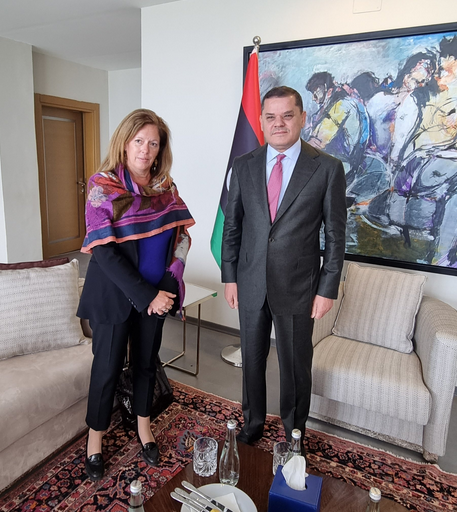Libya’s 24 December presidential election will have to be delayed
Published on Thursday 9 December 2021 Back to articles
UN special advisor Stephanie Williams and GNU Prime Minister Abdelhamid Dbeibah
The run up to the presidential elections will remain fraught, and there is now a serious possibility that the polls won’t go ahead as scheduled on 24 December. Given the current situation and ongoing tensions, it is difficult to see how the vote can be secured, let alone how those who disagree with the results will accept them.
As the date draws nearer, all eyes will are focused on the High National Election Commission (HNEC) and its final list of approved candidates which was due out at any time now but this has not happened yet. It is under enormous pressure from all sides over this list, with each camp desperate to ensure that its own candidates are included and that those from the opposing camp are disbarred. This has already delayed the publication of the list.
If this final list includes Abdelhamid Dbeibah, Khalifa Haftar or Saif al-Islam Qadhafi, it will provoke a major backlash one way or another. This is likely to include demonstrations as well as armed groups in the west attacking election centres and occupying buildings in order to prevent the polls from taking place, although more serious unrest remains a possibility. It could also see eastern Libya turn its back on the whole process with increasing calls within the region for the establishment of its own government.
Calls for an election boycott will grow among various western constituencies which will also press hard for a referendum on the constitution to be held before any poll. These calls will be supported by Turkey, which is keen to extend the life of Dbeibah’s Government of National Unity (GNU) and ensure that Haftar plays no part in Libya’s political future.
Stephanie Williams’ return as the UN Secretary General’s special advisor has been welcomed by some and she has already met most of the main players. It has, however, being met with suspicion and hostility by others who believe that she is the stooge of Washington and the EU. While she was able to achieve success in her role last time around, things will now be more challenging. This is because she is considered to be behind the creation and installation of Dbeibah who, not only very quickly showed himself to be a man of western Libya, but who has become part of the problem rather than the solution.
Progress over the withdrawal of foreign mercenaries and military forces will remain stalled until after the elections. In reality, although the 5+5 Joint Military Commission (JMC) is expressing optimism following its visits to Turkey and Russia, neither of these two states will agree to remove their forces out of Libya in the foreseeable future.
The conflict between Mustafa Sanalla and Minister of Oil Mohamed Oun will continue, with the latter still determined on removing the National Oil Corporation’s (NOC) chairman. Although Sanalla will stand firm, knowing that he has the support of both the international community and the IOCs, this constant bickering and struggle for control will bode ill for the smooth running of the vitally important energy sector.
This excerpt is taken from Libya Focus, our monthly intelligence report on Libya. Click here to receive a free sample copy.


